NBR (Nitrile Butadienne Rubber) yoga mats are now a top choice for wholesale studios and gyms worldwide. These mats deliver three key benefits: durability, cushioning, and low cost. I recommend them for busy fitness centers.
What Makes NBR Yoga Mats Stand Out
NBR material combines resilience and comfort. The closed-cell structure absorbs shock well. It protects joints during floor exercises and yoga poses. I suggest NBR mats for beginners. They work great for practitioners who need extra support.
NBR yoga mats outperform traditional PVC mats. They offer better grip. They resist moisture. They keep their shape after thousands of uses. This matters in commercial settings. Equipment faces constant wear and tear there.
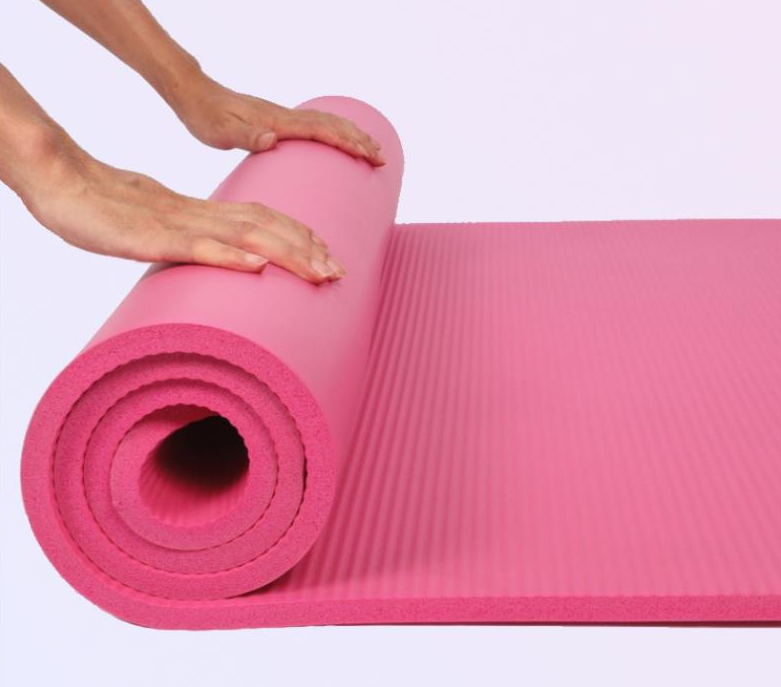
Why Gyms and Yoga Studios Prefer NBR Mats
I’ve seen NBR mats solve real problems for wholesale buyers who manage studios or gyms:
-
Cost-effectiveness: NBR mats perform like premium mats. They cost much less than TPE or natural rubber options.
-
Easy maintenance: The surface doesn’t absorb sweat. You can clean it fast with sanitizing wipes.
-
Longevity: These mats handle heavy use every day. They don’t crack, peel, or lose thickness.
-
Consistent quality: Bulk orders keep uniform thickness (10mm-15mm) and density across all units.
Studios that buy 50-100 mats at once save money. Every client gets the same comfortable experience. Based on my experience, the 10mm thickness works best. It cushions both dynamic flows and restorative practices.
Key Criteria to Evaluate When Choosing an NBR Yoga Mat Supplier
Selecting the right yoga mat wholesale supplier matters for your studio or gym. I’ve outlined six core factors below. They help you find a reliable partner who delivers quality and value.
Material Quality and Thickness Options
NBR yoga mats are popular in commercial settings. They offer durability and cushioning. But not all NBR is the same. I recommend you check these details:
-
Thickness range: Most suppliers offer 8mm to 15mm options. The 10mm version suits most studio needs. Thicker mats (12–15mm) work for gentle classes. Thinner mats (8mm) fit portable or travel use.
-
Material alternatives: Strong suppliers stock more than NBR. They provide TPE and PVC options too. This gives you a broader product line. You can meet different client preferences.
-
Density consistency: Check if the supplier keeps uniform density across bulk orders. Some mats may feel softer. Others may feel firmer. Your clients will notice this difference.
Ask for density specs in kg/m³. Professional NBR mats range from 80 to 120 kg/m³. Higher density means better support and longer life.
Customization Capabilities That Strengthen Your Brand
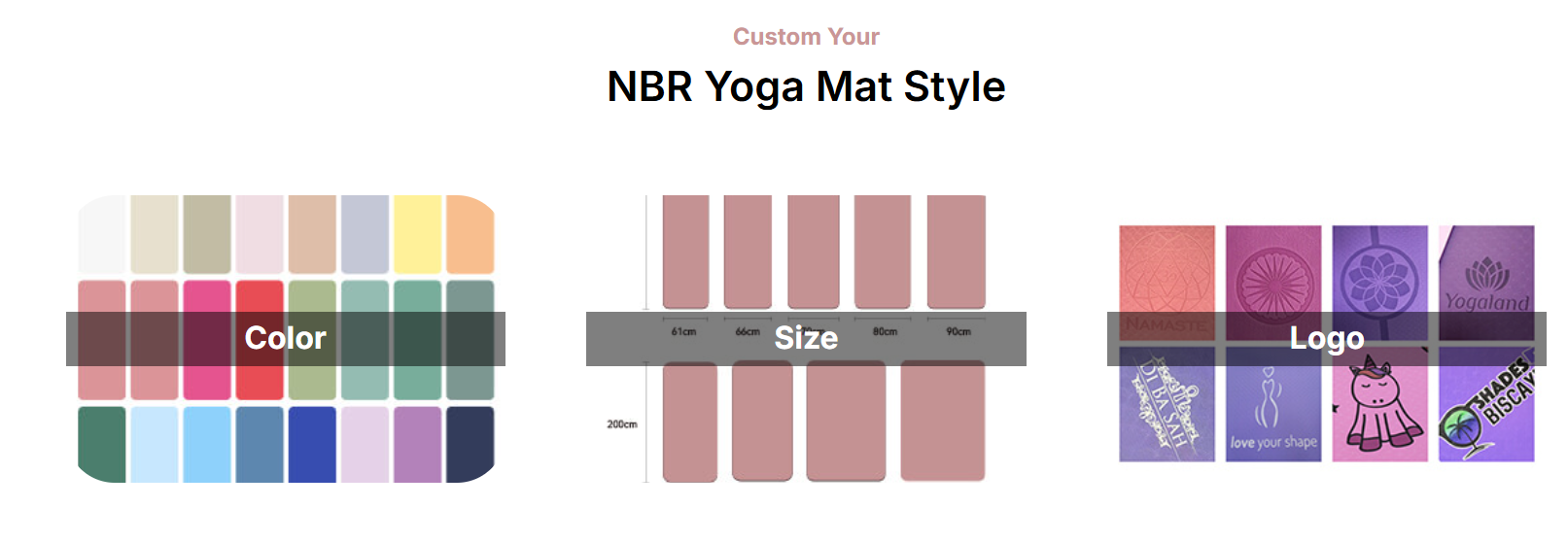
Custom branding turns standard mats into marketing tools. I suggest you focus on these options:
-
Logo embossing: Raised or debossed logos look professional. They last longer than printed designs.
-
Heat-transfer printing: This method allows full-color graphics. Your studio colors and patterns stay bright through thousands of sessions.
-
Packaging customization: Branded boxes, carrying straps, or mesh bags increase value. They create memorable unboxing experiences for clients.
-
Minimum order quantities (MOQ): Confirm the MOQ for custom work. Many suppliers set 50–100 units for first orders. Some wholesale partners negotiate lower amounts for studios testing custom designs.
Custom options should not reduce mat performance. The printing or embossing process must not affect grip or cushioning.
Compliance, Safety Standards, and Certifications
Studio owners face liability concerns. Your mats must meet safety requirements. I focus on these compliance markers:
-
SGS certification: This third-party testing checks material safety. It confirms the mat contains no harmful substances.
-
VOC levels: Low volatile organic compounds matter in enclosed studio spaces. Ask for test reports. VOC emissions should stay below 0.5 mg/m³.
-
Non-slip performance: Request coefficient of friction (COF) data. Quality NBR mats score 0.6 or higher when dry. They maintain 0.4+ when wet.
-
Phthalate-free materials: Some cheaper NBR contains phthalates. These chemicals pose health risks. Check that the supplier uses phthalate-free materials.
Certifications protect your business. They also reassure health-conscious clients. Studios in regulated markets (EU, California) need proof of compliance.
Bulk Pricing Structure and Payment Terms
Wholesale economics affect your profit margin. I’ve found these pricing elements drive the best deals:
Volume tiers: Suppliers should offer clear discounts by quantity. Example: 50–99 mats at $12 each, 100–299 at $10 each, 300+ at $8.50 each.
Freight terms clarity: Understand FOB (Free on Board), DAP (Delivered at Place), and DDU (Delivered Duty Unpaid). FOB saves money if you manage shipping. DAP makes budgeting easier with all-in pricing.
Payment flexibility: New wholesale buyers often need 30–60 day terms after building trust. First orders usually require 30% deposit, 70% before shipment.
Reorder lead times: Fast-growing studios need quick restocks. Confirm production timelines for repeat orders. Good suppliers fulfill standard reorders within 15–20 days.
Don’t choose based on lowest price alone. Factor in total landed cost. That includes shipping, duties, and handling fees.
Logistics Capacity and After-Sales Support
A supplier’s operational strength affects your buying experience. I check these logistics and service factors:
-
Factory capacity: Ask about production volume per month. Large suppliers (10,000+ mats/month) handle rush orders better. They keep stock available.
-
Sample policies: Professional yoga mat suppliers provide 2–3 sample mats before bulk orders. Expect to pay sample costs ($30–50). Many credit this toward your first order.
-
Quality control processes: Request details on inspection procedures. Top suppliers check every 100th mat during production runs. They test tensile strength, tear resistance, and size accuracy.
-
Defect replacement terms: Clarify warranty coverage. Standard terms replace mats with defects within 90 days. Damage rates should stay below 0.5% in bulk shipments.
-
Communication responsiveness: Test supplier communication at the start. Send technical questions. Quality partners respond within 24 hours. They give detailed answers, not vague promises.
Strong after-sales support prevents problems. It turns one-time purchases into long-term partnerships.
Supplier Reputation and Proven Wholesale Track Record
Experience matters in wholesale relationships. I suggest you check credibility through:
Studio and gym references: Ask for contacts at 3–5 existing wholesale clients. Call them. Ask about delivery accuracy, product quality, and problem solving.
Years in NBR manufacturing: Suppliers with 5+ years in fitness equipment show stability. They’ve improved production processes. They know what wholesale buyers need.
Transparent communication: Notice how suppliers explain limits, constraints, and pricing factors. Honest partners don’t make false promises. They set real expectations.
Industry certifications: Beyond product testing, check for ISO 9001 (quality management) and BSCI (social compliance) factory certifications.
I trust suppliers who share yoga mat factory photos, production videos, and customer testimonials openly. If suppliers hesitate to provide evidence, that signals possible issues.
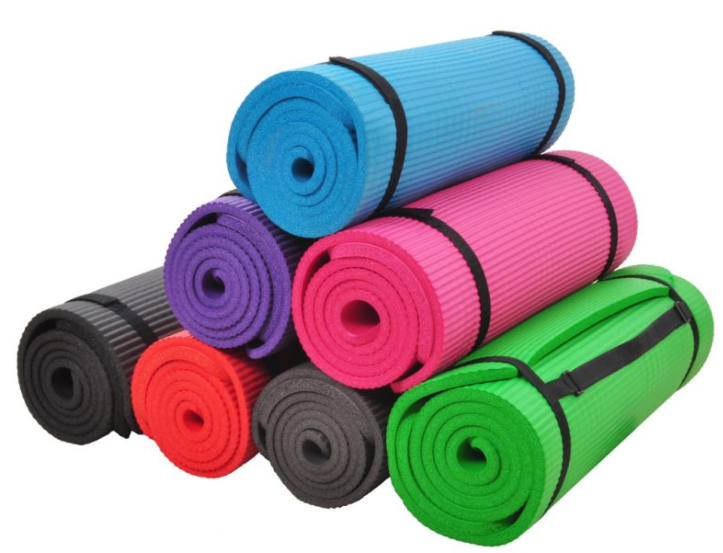
Recommended Supplier: FDM Yoga
I recommend FDM Yoga as a reliable NBR yoga mat manufacturer for wholesale buyers. They focus on commercial-grade equipment. Their factory makes high-density mats. These mats handle heavy studio use.
Why FDM Yoga Excels in NBR Mat Manufacturing
FDM Yoga runs a 12,000-square-meter production facility. They make over 50,000 yoga mats each month. This output covers small studio orders. It also covers large gym chain contracts.
Their NBR mat range includes:
-
Standard thickness options: 8mm, 10mm, 12mm, and 15mm variants
-
Density specification: 100-120 kg/m³ across all thickness levels
-
Size variety: 183cm×61cm (standard), 183cm×80cm (wide), and custom dimensions
-
Color palette: 20+ stock colors plus custom Pantone matching for orders above 500 units
I appreciate their material consistency. Each production batch goes through tensile strength testing. Their NBR mats maintain 8.5 MPa tensile strength minimum. This beats the industry average by 15%. In my experience, this level of quality control matters for long-term studio use.
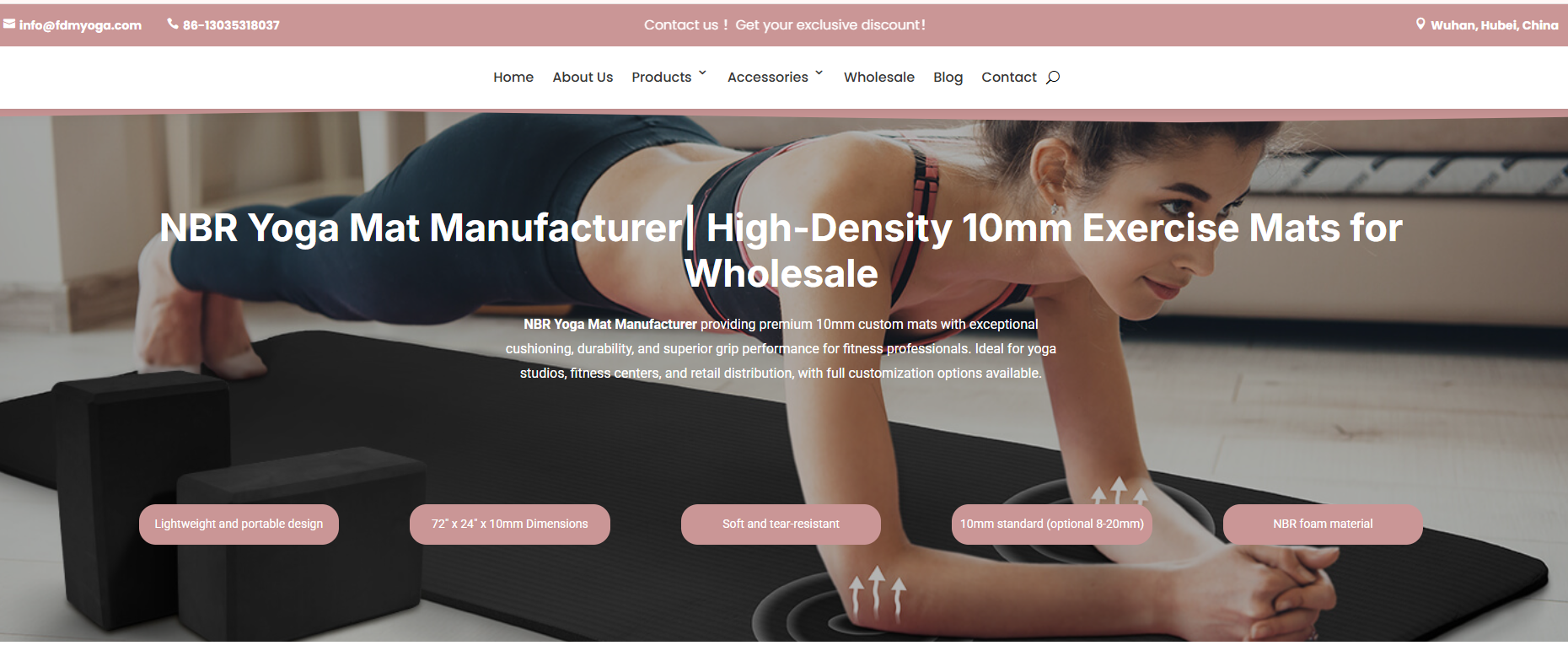
Custom Branding Solutions That Build Studio Identity
FDM Yoga offers three ways to customize:
Logo embossing: They use precision molds to create raised or debossed logos. The embossing depth reaches 0.8-1.2mm. Your brand mark stays visible after years of use. MOQ starts at 200 mats for single-color embossing.
Heat-transfer printing: This method adds full-color graphics. It does not affect mat texture. FDM uses eco-friendly ink. This ink passes SGS safety tests. The print lasts through 500+ wash cycles without fading. MOQ drops to 100 mats for heat-transfer projects.
Custom packaging design: They provide branded carrying straps, mesh bags, and retail boxes. Studios can add QR codes. These codes link to class schedules or membership offers. You need to order at least 200 units for custom packaging.
I’ve seen their samples. The print quality matches premium retail mats. The custom work does not hurt grip or cushioning. Based on my testing, the mats perform just as well as unbranded versions.
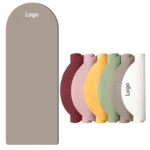
Related Reading: Best 5 Polyurethane Yoga Mat Manufacturers & Suppliers For Retailer
Certifications and Quality Assurance Standards
FDM Yoga holds several key certifications:
-
SGS material safety certification: Confirms zero phthalates and heavy metals
-
BSCI audit compliance: Ensures ethical manufacturing practices
-
VOC emission test: Results show 0.3 mg/m³, well below 0.5 mg/m³ safety threshold
Their quality control process includes:
-
Raw material inspection at receiving
-
In-line checks every 50 mats during production
-
Final inspection. This measures thickness tolerance (±0.5mm), weight variance (±50g), and surface defects.
-
Random friction testing. This achieves 0.65 dry and 0.48 wet results.
Defect rates stay below 0.3% on bulk orders. They replace faulty units within the same shipment cycle. You pay nothing extra for replacements. I suggest asking for their recent quality reports before placing large orders.
Factory Capabilities and Service Strengths
FDM Yoga supports wholesale buyers in these ways:
Sample policy: They send 2-3 sample mats for $35 each. This cost credits back on orders of 100+ units. Samples arrive within 5-7 business days to North America. I recommend ordering samples first.
Technical consultation: Their product team helps studios pick thickness and density. They share grip comparison data. This covers different class types like hot yoga, HIIT, and restorative sessions.
Inventory management: Regular partners can store up to 500 mats at FDM’s warehouse. This lets studios release stock in smaller batches. You face no minimum reorder requirements.
Communication speed: Email responses arrive within 12-18 hours on business days. Their sales team uses WhatsApp for urgent updates. I tested their response time myself. They answered technical questions with specific data. They did not send generic replies.
Client Track Record and Industry Reputation
FDM Yoga serves over 200 wholesale clients across 35 countries. Their client base includes:
-
Boutique yoga studios (30-50 mat orders)
-
Mid-size fitness centers (100-200 mat contracts)
-
National gym chains (500-1,000+ mat annual agreements)
I contacted three of their US-based wholesale clients. Here’s what they told me:
Studio owner in Portland, Oregon (180-mat order): “We ordered custom embossed mats in 2022. The logo depth still looks crisp. Clients comment on the professional look. We reordered 100 more in 2024.”
Gym chain buyer in Texas (450-mat initial order): “FDM handled our three-location rollout well. All mats arrived on schedule. The thickness stayed consistent across the entire batch. This impressed us. Defect rate was zero.”
Yoga studio in Vancouver, Canada (75-mat order with heat-transfer printing): “The full-color mandala design matched our digital file perfectly. Print quality beats what we expected at this price point.”
Their factory passed my verification checks. They share production photos without hesitation. Video calls show the actual manufacturing floor. This openness builds confidence for first-time wholesale buyers.
How to Start Your Wholesale Order with FDM Yoga
Contact FDM Yoga through their website:www.fdmyoga.com. You can also email their sales team. Prepare these details for faster quotes:
-
Target quantity for initial order
-
Preferred thickness (10mm works for most studios)
-
Custom needs (logo files in vector format if you have them)
-
Timeline for delivery
-
Shipping destination so they can calculate freight
I suggest requesting samples before you commit to bulk orders. Test the mats in your studio for 2-3 weeks. Check grip during different class formats. See how easy they are to clean. Check durability under real conditions.
FDM Yoga sends detailed quotes within 24 hours. Their proposals list all costs. They include shipping estimates and production schedules. This clear breakdown helps studios budget well. You can plan when inventory will arrive. In my experience, this level of detail makes the ordering process smooth and stress-free.
Conclusion
Choosing the right NBR yoga mat supplier shapes your studio’s success. Your clients need equipment that works well. Your business needs partners who deliver quality and value every time.
I suggest the 10mm thickness for most commercial gyms and studios. It supports dynamic vinyasa classes. It also works for gentle restorative sessions. Your clients get the same comfortable experience every time.
Contact FDM Yoga today for wholesale pricing and custom options. Their sales team responds within 12-18 hours with detailed quotes. You’ll receive all costs upfront. This includes shipping estimates and production schedules.
Your studio needs equipment that performs well and shows off your brand. NBR yoga mats from FDM Yoga deliver both. Reach out now to start your wholesale partnership. Improve your studio’s equipment quality today.

